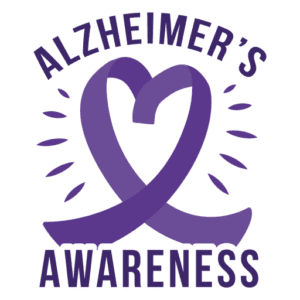Go Purple
by Robin Bush, ISR Communications
June is Alzheimer’s and Brain Awareness Month, and we join in “going purple” to show support for research, support, and education for caregivers, patients, and the public worldwide.
Dementia is a broad term for a group of symptoms centered around difficulties with problem-solving, thinking skills, language, and memory. Changes in the brain cause various types of dementia, including Alzheimer’s disease.
Many physical conditions can cause cognitive changes, so it is essential to see your doctor for a complete evaluation if you begin to notice changes. In addition, pay attention if you or a loved one show signs of memory loss that disrupts daily life, difficulty completing familiar tasks, confusion, problems with words in speaking or writing, withdrawal from work or social activities, or changes in mood or personality.
Medicare recently approved reimbursement to doctors, physician assistants, nurse practitioners, and others for a clinical visit that results in a care plan (CPT code 99483). These exams include an exam focused on cognition and an interview to obtain a medical history and understand current issues. If you have concerns, don’t put them off; early diagnosis is essential. Most of us experience age-related memory decline, but if you are diagnosed with dementia, some medications can treat symptoms for a while, and early diagnosis provides the opportunity to plan for the future and connect to support services.
What’s the difference between warning signs of dementia and typical age-related changes?
- Regular poor judgment and decision-making vs. making a wrong decision occasionally
- Inability to manage a budget vs. missing a monthly payment
- Losing track of the date or the season vs. forgetting which day it is and remembering later
- Difficulty conversing vs. sometimes forgetting a word
- Misplacing things and being unable to retrace steps to find them vs. losing things from time to time
(Source: Alzheimer’s Association)
Since your doctor can’t observe how you or a loved one are dealing with day-to-day challenges, it helps to keep a notebook and record events that can be shared and discussed.
After a friend of mine was diagnosed with dementia, and plans were made for what she’d eventually need, the next question her adult children asked was, “Are there ways to avoid or delay dementia?” It is never too early to incorporate healthy habits to support brain health. Research shows that brain changes may begin as much as 20 years before symptoms start. The dementia prevention lifestyle plan includes getting adequate rest, stopping smoking, eating a heart-healthy diet, reducing alcohol consumption, preventing brain injuries with safety measures like wearing seatbelts and wearing a helmet in sports, maintaining regular social contact, challenging your mind with learning new things like starting a new hobby or taking a class, and getting regular cardiovascular exercise.
Recently I read an interview with a high school friend of mine, Peter Gallagher, who has become a well-known Hollywood actor. His mother had Alzheimer’s for nearly 20 years, gradually descending from memory lapses to oblivion and inability to recognize friends and family. Like most families, watching his mother decline was overwhelming, yet he speaks to the beauty of small moments when caring for someone with Alzheimer’s. “Alzheimer’s is a harrowing journey, but there are moments of grace and poetry where for a moment, the person you love makes themselves visible.” “Even though my mother lived a long time with it, the disease progressed quickly. All of a sudden, she was a little out of reach, and then it just kept going. But even at the end, there were moments of grace. If I sang her a song or we danced a bit, she would say, “Now that was real!” I don’t think she recognized us, but she recognized feelings. If she felt love, her face would show it.” Thank you, Peter, for reminding us to cherish the good moments we have with others, whatever our path may be.
Note: A wide range of downloadable resources and topical articles for patients and caregivers are available by going to www.alz.org and searching “publications.”

